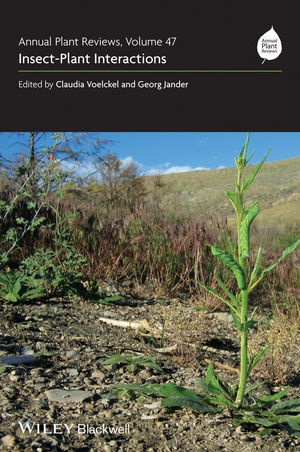Read more
Informationen zum Autor Claudia Voelckel is a genetics lecturer at Massey University, Palmerston North, New Zealand. She is investigating plant-insect interactions, ecological divergence and the adaptive potential of species in the New Zealand flora. Comparative transcriptomics and genome analyses are an important aspect of this work. Georg Jander is an associate professor at the Boyce Thompson Institute, an independent plant research institute on the campus of Cornell University in Ithaca, New York. Professor Jander's research is focused on using genetic and biochemical approaches to identify molecular mechanisms of plant resistance to insect herbivores. Klappentext This latest volume in Wiley Blackwell's prestigious Annual Plant Reviews brings together articles that describe the biochemical, genetic, and ecological aspects of plant interactions with insect herbivores.. The biochemistry section of this outstanding volume includes reviews highlighting significant findings in the area of plant signalling cascades, recognition of herbivore-associated molecular patterns, sequestration of plant defensive metabolites and perception of plant semiochemicals by insects. Chapters in the genetics section are focused on genetic mapping of herbivore resistance traits and the analysis of transcriptional responses in both plants and insects. The ecology section includes chapters that describe plant-insect interactions at a higher level, including multitrophic interactions, investigations of the cost-benefit paradigm and the altitudinal niche-breadth hypothesis, and a re-evaluation of co-evolution in the light of recent molecular research.Written by many of the world's leading researchers in these subjects, and edited by Claudia Voelckel and Georg Jander, this volume is designed for students and researchers with some background in plant molecular biology or ecology, who would like to learn more about recent advances or obtain a more in-depth understanding of this field. This volume will also be of great use and interest to a wide range of plant scientists and entomologists and is an essential purchase for universities and research establishments where biological sciences are studied and taught.To view details of volumes in Annual Plant Reviews, visit: www.wiley.com/go/aprAlso available from Wiley:Plant DefenseDale Walters9781405175890Herbicides and Plant Physiology, 2nd EdnAndrew Cobb & John Reade9781405129350 Zusammenfassung Part of Wiley-Blackwell's highly successful Annual Plant Reviews, Annual Plant Reviews: Insect-Plant Interactions provides scientists with cutting edge, up-to-date information on biochemical and molecular aspects of a wide array of often commercially important and fascinating interactions between plants and insects. Inhaltsverzeichnis List of Contributors xv Preface xxi Section 1 Biochemistry of Insect-Plant Interactions 1 Plants Recognize Herbivorous Insects by Complex Signalling Networks 1 Gustavo Bonaventure 1.1 Introduction 1 1.1.1 The feeding behaviour of insects is an important determinant of the plant's defence response 1 1.1.2 Insect-associated elicitors are specific elicitors of plant responses to insect feeding or egg deposition 2 1.2 Resistance (R) genes in the perception of piercing-sucking insects 6 1.3 Modification of elicitors by plant enzymes 8 1.4 Changes in Vm, Ca2+influx and reactive oxygen intermediate generation are early cellular events induced in plants by insect feeding 9 1.5 Shared signal transduction components in microbe and insect elicitor perception 12 1.6 Regulation of phytohormone accumulation and signaling during insect feeding 14 1.6.1 Jasmonic acid 17 1.6.2 Ethylene 20 1.6.3 Salicylic acid 21 1.7 Interconnection of the phytohormone system in plants 22 1.8 Conclusions a...

